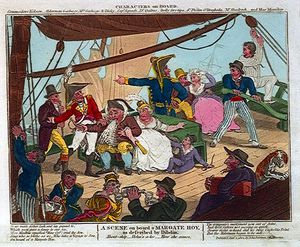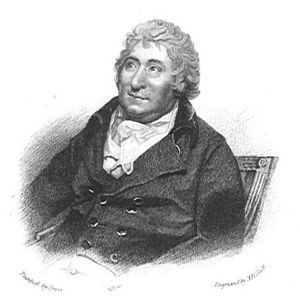Annotation:Margate Hoy (The)
Back to Margate Hoy (The)
MARGATE HOY, THE. English, Country Dance Tune (6/8 time). G Major. Standard tuning (fiddle). AABB. The melody was entered into the music manuscript copybook of musician John Fife, a fifer or fiddler who may have been from Perthshire and who made his entries in the last two decades of the 18th century. Fife may also have been to sea, for there are references to battles in the Caribbean and the Mediterranean in his collection.

A 'hoy' was a small sloop-rigged coasting ship or a heavy barge used for freight, usually displacing about 60 tons. The word derives from the Middle Dutch hoey. The multi-purpose hoys were employed by the British navy as workboats, to transport fresh water, gunpowder or ballast, or for laying buoys or survey work. Others escorted coastal convoys and were deployed against smugglers. A faster and bigger version would be called a cutter, and a hoy or cutter used for fishing called a smack, but they are essentially much the same. During the wars with France at the end of the 18th century the Royal Navy armed some Dutch hoys as gun-ships, particularly for service under Admiral Sir Sidney Smith. Concern about a possible French invasion led the Royal Navy in 1804 to arm sixteen hoys at Margate for the defense of the coast. However, hoys also had a common civilian purpose, as the quite large ones transported holidayers down from London to the north Kent coast, notably Margate.
The hoy, a rather modest, even comical workboat, seemed to inspire Charles Dibdin (1745-1814), who composed a comic song called "The Margate Hoy." It begins:

Standing one summer's day on the Tower Slip,
Careless how I my time should employ,
It popp'd in my head that I'd take a trip
Aboard of a Margate hoy:
I took a few slops, such as shirts and a coat,
For of prog I knew well they'd be stor'd;
Then I hall'd a pair of oars, shov'd off my boat,
And away I dash'd aboard.
There is an Elia essay by Charles and Mary Lamb, entitled "The Old Margate Hoy," who describe:
...we were happy many years ago for a brief week at—-Margate. That was our first sea-side experiment, and many circumstances combined to make it the most agreeable holyday of my life. We had neither of us seen the sea, and we had never been from home so long together in company.
Can I forget thee, thou old Margate Hoy, with thy weather-beaten, sun-burnt captain, and his rough accommodations—ill exchanged for the foppery and fresh-water niceness of the modern steam-packet? To the winds and waves thou committedst thy goodly freightage, and didst ask no aid of magic fumes, and spells, and boiling cauldrons. With the gales of heaven thou wentest swimmingly; or, when it was their pleasure, stoodest still with sailor-like patience. Thy course was natural, not forced, as in a hot-bed; nor didst thou go poisoning the breath of ocean with sulphureous smoke—a great sea-chimaera, chimneying and furnacing the deep; or liker to that fire-god parching up Scamander.
See "Annotation:Margate Assembly" for more on the spa town of Margate.
Source for notated version:
Printed sources: Thompson (Compleat Collection of 200 Favourite Country Dances, vol. 5), 1788; No. 122, p. 61.
Recorded sources:
